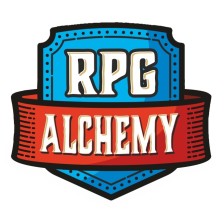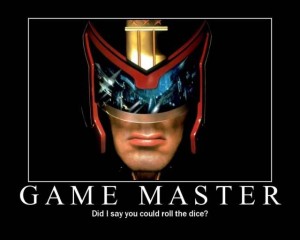Rarely do I have the opportunity to play a character, 99.99% of my gaming time is spent as a GM, but I do manage to play a couple of times a year when I go to conventions. I always have fun when I go��but you never really know about what kind of game you’re going to get when playing with a GM you’ve never met. Last time I went I was fortunate enough to play in one great game, but I also played in a horrible one. On the surface the bad game should have been better; the GM seemed well-prepared and knowledgable, the adventure itself was potentially��cool, and the players were cooperative and enthusiastic. But despite having all the right elements for a great experience the game fell flat and ultimately ended up being 8 hours of my life that I’m never getting back.
When I initially left the game I wasn’t really sure what went wrong. The game had so much potential but ultimately I realized that the only real problem was the experience just wasn’t any fun. More importantly, the reason the game wasn’t fun was because of a GM who��worked hard at preventing the game from being fun. In all fairness I’m sure this wasn’t the GM’s intention, he put a lot of work into the game and was, after all volunteering to run it for strangers. ��Unfortunately despite his efforts��and intentions the game ended up being sort of, meh. The experience had an upside however, it forced me to look at gamemastering from a player perspective and think about��what happened and give me a greater understanding of my role as GM in making the experience FUN.
While I was driving home from the convention I spent a lot of time thinking about that game and how a GM can make the roleplaying experience more fun (I always have time to think on the drive home because everyone else is sleeping in the van). I also thought about the things in that game that the GM did which basically killed the fun, things like:
- Not allowing the diplomat to sway the crime lord regardless of roleplaying (which was awesome) or dice roll (which was decent).
- Telling the wookie that he wouldn’t work with the trandoshan because “Wookies don’t do that.”
- Having things that “interfered with the force” everywhere, essentially shutting down the jedi.
- Telling the tech that she couldn’t even attempt slicing open the door because it was too difficult.
- Preventing the smuggler (me) from shooting first! I had to wait for the Imperial “villain speech” to finish and then he got to attack me.
Looking at a few of these examples it completely dawned on me that this GM didn’t fail to make the game fun, he failed to allow the game to be fun! All of his careful prep-work, cool hand-outs, and well thought-out plot lines��were for nothing because he absolutely couldn’t deviate from the way he envisioned the scenario progressing. His desire to keep us “on track” and expose us to his “awesome story” led him to continually shutting us down until the point that we basically just let him narrate the adventure. Instead of playing an interactive RPG we were all just sitting around for GM story time. One of the worst cases of masturbatory GMing I’ve ever seen!
With the convention behind me and a great group of regular players at the table, I started thinking about whether I have fallen into this behavior in the past and ways to avoid it in the future. I have always wanted to deliver a great gaming experience to my friends, people taking time out of their busy schedules to enjoy a game and have fun. This experience helped me realize that as a GM I don’t need to focus so much on making the game fun, I just need��to let the game be fun and not let my GM-ego get in the way of the fun. There are several things you can do to let the fun happen at your table:
- Say Yes. You’ve probably read dozens of articles and books on the power of “yes” but don’t underestimate how important it is to players in their pursuit of fun. Players can accept failing at something but nothing kills the mood like not even being able to try. Embrace the power of Yes!
- Keep it Loose. I know you’ve spent hours upon hours creating a cool plot and interesting story-arcs but that kind of effort��tends to make us GM’s too invested in our story instead of the heroes’ story. Keep your plot loose and flexible. A great GM stays just ahead of his players throwing down story in front of them, not keeping them “on track”.
- Let the Players Inspire. Being a GM is a lot of work, coming up with interesting ideas and exciting events, but we often overlook our greatest resource, the players. In the past I’ve often put way too much time and energy into elements the players barely acknowledged. These days I listen to what the players are saying and use their characters’ own fears, goals, and speculations to craft plot elements. Less work on my part and more fun for them.
- Be a Fan of the Heroes. This is a key element in the Dungeon World RPG. As a GM you need to be the players’ biggest fan. Put them in situations where they can use their cool abilities and do amazing things. Celebrate their victories and lament their defeats. Facilitate their awesome!
I’ve found that all of these things can really improve the experience for the players at your table. One of the most important things you as a GM can remember is that it’s the players’ game, not your game. Your goal should be to allow��the players to have a great time doing the things they love, not being an obstacle between them and the fun.


Great topic, and great minds think alike. After reading a topic on The Illuminerdy last night I thought about this very thing. Specifically, players trusting their GM (and conversely, GMs trusting their players). You really have to have that to have a great game.
Trust that the GM won’t screw you over when you ask a genie for a very open-ended and vague wish. Trust that the GM won’t screw you when you drink an unidentified potion. But the GM needs to give it back in turn. He needs to help turn those experiences into AWESOMENESS and allow a great story to be told.
It’s a give and take with players and GMs. If it turns one-sided, the game can suck. It sounds like in your situation, the GM was there to tell HIS story and you just happened to be pushing a character forward on his plot line.
Samuel Van Der Wall recently posted…10 Sci-Fi Plot Twists
Trust the GM, never trust a genie…
I think we as GM’s sometimes work too hard to make a game fun; as opposed to just letting it develop organically. I’ve been that GM in the past, way too caught up in my own “brilliant” plot and not paying attention to the players needs.
These days I keep it loose and flexible and try and stay just ahead of the players while allowing them to go where they want. My job is to continually throw challenges and obstacles in the players way instead of trying to keep them “on track”.
John Lewis recently posted…This Week In Roleplaying – January 2nd, 2015
If this post was made ten or more years ago, I would have worried that it was one of my games.
Since then I generally er in the opposite direction, with barely more than a single sheet of prep done (other than exhaustive reading of rules and backgrounds obsessively for fun).
Mike: I’m in exactly the same boat. These days my prep work is usually just a couple of 3×5 cards and a handfull of bullet-points to remind me of important things that are currently going on. In fact, I tend to have more notes at the end of a session than at the start.
John Lewis recently posted…This Week In Roleplaying – January 2nd, 2015
Great advice, John. This reminds me of the book Infinite Games by James Carse.
The goal of an infinite game is to make moves that keep the game going. Make moves that open up fantastic new move choices.
Johnn Four recently posted…Left Hooks: 24 Plot Twist Ideas & Design Patterns
Good point Johnn. Try to open more doors then close and all that.
John Lewis recently posted…Alchemists’ Guide to Campaign Design: Prelude
Wonderful article. I am always forgetting this advice, mostly I think due to fear of being out of control.
That fear comes up strongest for me when my player(s) are looking at me like “and then what happens” and I’m not sure what the answer is. Then, when I DO suddenly come up with a plot, I don’t want to let any part of it go for fear I’ll run out of ideas again. Also, when I’m giving into fatigue, I don’t want to “make moves that open up fantastic new move choices” like Johnn said up there, because I don’t want to have to keep running. Maybe that why we call it “running” because its somewhat like a marathon, one step after another for a long, long time.
But, when the GM and Players are having fun, the finish line become kind of a bummer, and not a respite.

Murky Master recently posted…Roleplayer’s Library Review: Pride and Prejudice and Sense and Sensibility
@Murky Master: I’ve told a lot of GM’s over the years to not worry about your ideas drying up or saving your best stuff for “later”. Creativity begets more creativity. You will always have another awesome idea so long as you don’t worry about having another awesome idea.
John Lewis recently posted…Your Child’s First Game Session